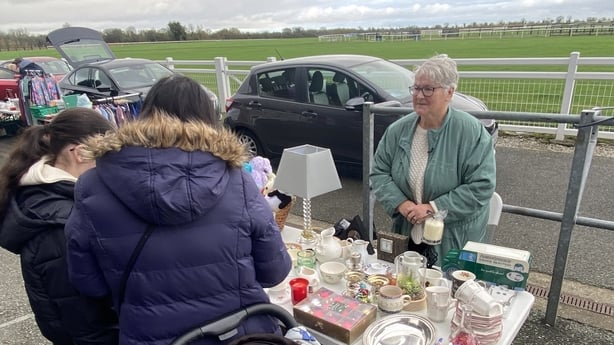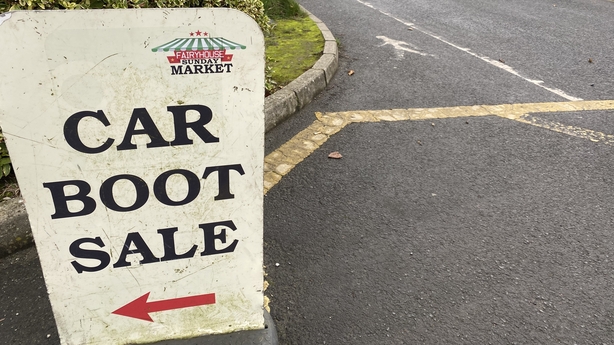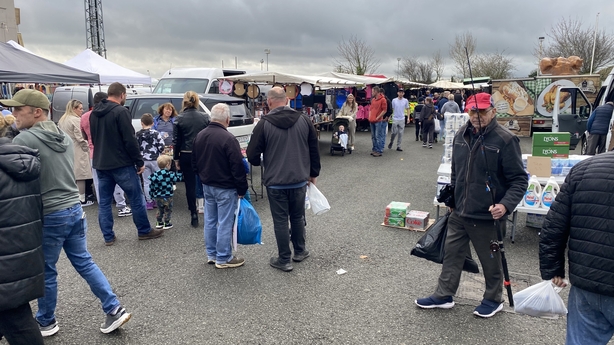
At the busy Fairyhouse Sunday Market in Co Meath, shoppers looking for a bargain interact with traders at stalls selling food, clothing, cosmetics, hardware and rugs.
There is also a car boot sale for people who want to de-clutter their homes.
Pensioner Marie Wilson operates a market stall selling antiques, toys and collectables.
She said that amid the soaring cost of living, her stall provides her with a vital top-up to her income.
"I do this for extra money, just to get a few extra shillings and it does help," Ms Wilson said.
"I don't relish getting up at 6am in the morning to do this but it's something that I need to top-up what my income is. I just feel a sense of freedom when I have an extra few bob in my purse."
Ms Wilson said that everything has gone up in price, particularly groceries.
"We must be the highest in Europe for food. I have to watch what I'm buying to make sure I am not overspending."

"The Government has been good at this time of year in the run up to Christmas, giving extra bonuses, I can't deny that, but hopefully that will continue," she added.
Pamir Wassiee, 22, came to the Sunday market hoping to find a bargain or two.
"The cost of living is a big election issue for me - 100%."
"I am working three jobs. I'm an apprentice, I am also self-employed, and I work at a garage as a mechanic. The car insurance is through the roof, it's going up every year. Getting insurance when you're self-employed in a trade is also shocking," Mr Wassiee said.
"The Government has said it is giving out extra credits and payments but that's a one-time thing. It doesn't help us all year round, or five years down the line. It'll only help us once and they did it to get votes. We need to see long term plans," he added.
Another shopper, Gareth Graham, said rising prices mean we all have to work more to pay for things.
"It means you are working more than you are living," Mr Graham said.
He added: "I know the minimum wage is going up in the new year so hopefully that will make a bit of a difference with inflation and help with the cost of living."
David Leonard is a pensioner.
"The cost of living is outrageous, especially for older people," Mr Leonard said.
"The cost of fuel is outrageous. Now don't get me wrong, the Government has done a good job and is doing the best it can, given the way the world is at the moment."

Inflation
Inflation has come down sharply in recent month but that does not mean that prices are falling.
It just means that the rate of increase has eased. Prices are still going up and are dramatically higher compared to five years ago, since the last election.
A lot has happened in that time including the impacts of Brexit, the Covid pandemic, Russia's invasion of Ukraine and the escalation of the conflict in the Middle East.
"The war in Ukraine sparked an international energy crisis, and as we use energy to manufacture and produce almost everything, this fed through into higher prices in almost every other sector," said Daragh Cassidy, Head of Communications at switching website Bonkers.ie.
Inflation soared to 7.8% in 2022 and reached a peak of 9.1% in June 2022, its highest rate in 38 years.
Contrast that with the inflation figure for October 2024 of just 0.7%.
But again, this does not mean prices are falling, they are just not going up as sharply as they were.
Food
Every shopper would agree that their grocery bills are a lot higher now compared to five years ago.
An analysis of CSO inflation data shows that food prices have increased by 28.9% since February 2020.
According to Bonkers.ie, in the past three years a white sliced pan rose by almost 25%, two litres of full fat milk went up almost 30% as did half a dozen large eggs.

A pound of butter rose over 30% while 500 grams of spaghetti increased by over 35%.
It means that households are now spending around €20 to €25 extra a week on their food or almost €1,300 a year.
Mortgages
Anyone lucky enough to have a low fixed rate for the last few years was shielded from the recent mortgage rollercoaster.
For many homeowners however, particularly tracker customers, their monthly repayments rose sharply as the European Central Bank (ECB) battled to lower inflation.
Between July 2022 and September 2023 ECB rates were hiked from 0% to 4.5% and although rates are now being cut, mortgage holders are still paying more than they were five years ago.
An analysis of CSO inflation data shows that mortgage interest has increased by a whopping 84.1% since February 2020.
Renters have also been hit hard by soaring costs, with rents up by almost 30% in the last five years.
Energy and fuel
Energy costs more than doubled following the outbreak of war in Ukraine.
"Despite recent moderate falls, electricity prices are still around 70% to 80% above where they were only three years ago while gas prices are still close to double previous levels," said Daragh Cassidy of Bonkers.ie.
"This means households are still paying around €900 a year more for their energy than they were until recently," he added.
Motorists also know only too well how expensive petrol and diesel have become.
An analysis of CSO inflation data shows that fuel prices are up by 19.2% since February 2020.
Insurance premiums
Insurance premiums have risen sharply in recent years.
The main health insurance companies have announced a series of hikes which, according to Bonkers.ie, means that come January, when most policyholders renew their plans, many families could be looking at paying at least €200 a year more for their insurance.
The cost of motor insurance has come down in recent years and has fallen by 12.5% since February 2020.

This follows reforms aimed at bringing down the cost of personal injury claims. However, motor policies have started to rise again in recent times with the cost of the average premium now around €50 to €60 higher than last year.
Anyone who has renewed their home insurance recently may also be feeling it in the pocket, these premiums are up by almost 35% in the last five years.
Childcare costs
Childcare costs in Ireland are among the highest in Europe and remain a major burden for families.
According to the official data, childcare costs have actually fallen in recent years and down by almost 37% compared to February 2020.
The outgoing Government would point to its "core funding" model which provides grants to childcare facilities if they agree to freeze the fees charged to parents.
But many providers claim the model is unsustainable and that they will have to increase their fees soon or face closure.
What can politicians do about high prices?
Politicians cannot force supermarkets to lower prices, banks to cut mortgage rates or insurance companies to reduce premiums.
They can impact prices by cutting taxes and duties on goods and services.
This was done by the outgoing Government, for example, in March 2022 when a temporary reduction was announced in the excise duties charged on petrol and diesel.
Governments can also introduce structural reforms to increase competition and reduce costs for businesses which should, in theory, lead to lower prices for consumers.
The outgoing Coalition will also point to the billions of euro worth of cost of living measures that have been introduced in recent budgets.
Energy credits, welfare increases, lump sum payments and tax cuts have all put more money in people's pockets.
The Opposition has accused the Government of not doing enough and economists warn that such measures can add to inflation.
Wages have risen in recent years but not at the same rate as price increases which is why so many people continue to struggle to make ends meet.
We may have falling inflation, reduced interest rates and full employment but elections are not won on economic data, they are won on acknowledging how people feel and offering real solutions to address it.
So while politicians may be limited in what they can do to address soaring prices, expect cost of living concerns to remain high on the agenda over the course of this election campaign.






